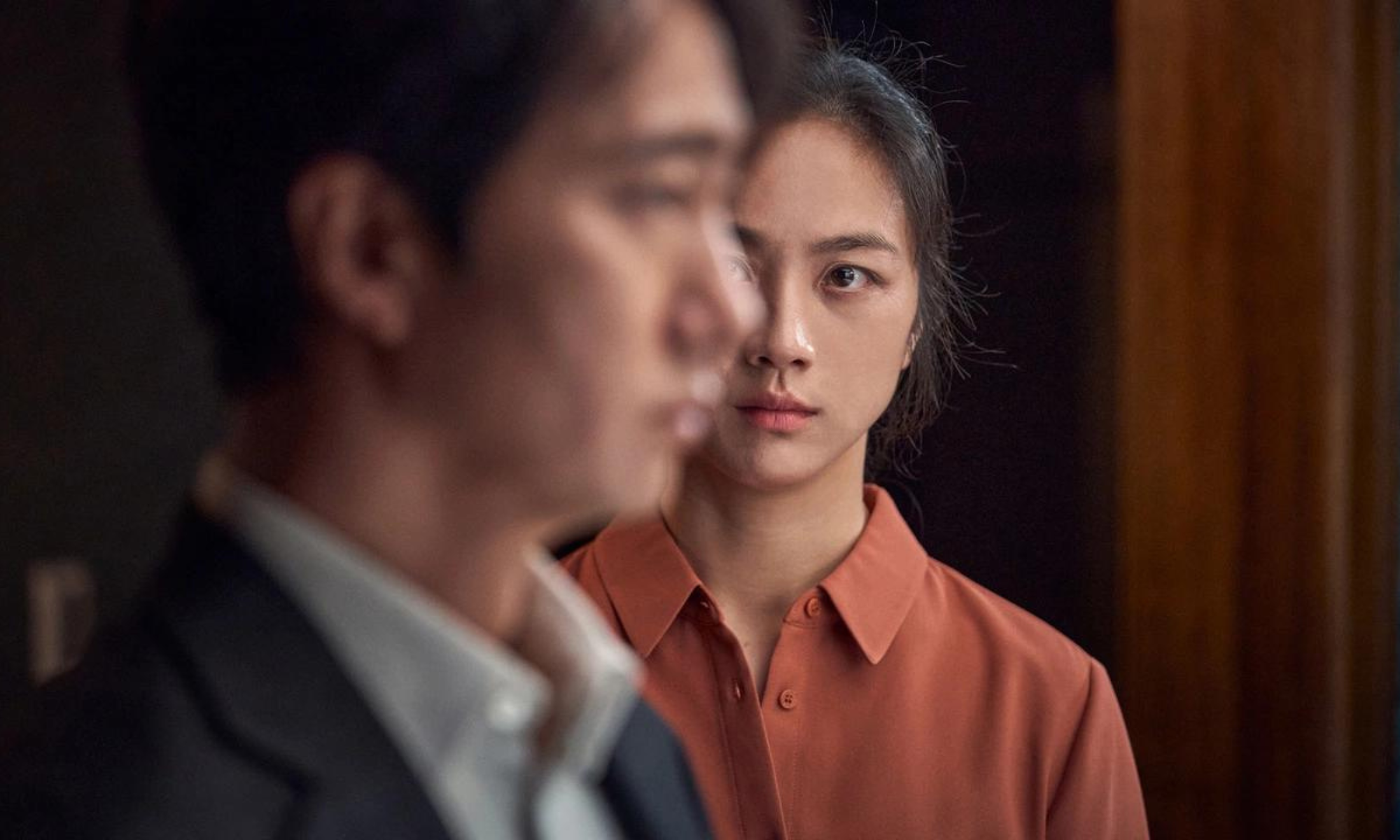In ‘Decision to Leave’, Park Chan-wook plays with our deepest desires
The award-winning film follows a couple whose romance shouldn’t work, but is hypnotic to watch.
Cici Peng
08 Nov 2022

courtesy of MUBI
Park Chan-wook’s ravishing neo-noir detective romance Decision to Leave asks if there is any difference between pursuing a suspect in a crime and pursuing a lover. Both probe you to step into someone else’s mind and inhabit their thoughts, behaviours and intentions. Yet in Decision to Leave, the romance and the investigation become inextricably intertwined, not only in the plot, but as an existential force that will haunt you long after the credits have rolled.
Winning Park the prestigious award of Best Director at Cannes this year, Decision to Leave is centred around a married, mild-mannered detective Hae-joon (Park Hae-il) who becomes increasingly consumed with a murder investigation and, more importantly, his prime suspect: an enigmatic Chinese immigrant Seo-rae (Tang Wei) who is suspected of killing her husband. As he follows her, we see his suspicion morph into fascination, then into all-consuming obsession.
Yet, this is not a typical film-noir centring on the perspective of the detective – Hae-joon is not the only one looking, not the only one privy to seeing someone’s most mundane yet intimate everyday rituals. Seo-rae looks back, her glance inquisitive and knowing. We begin to wonder if she has been the one in control all along. Park creates a mirage of masculine control only to break it, rebuking the male gaze and exposing the unbreakable self-knowledge of his captivating female protagonist.
“Park creates a mirage of masculine control only to break it”
Decision to Leave dances along the twisted line between love and obsession with a cutthroat precision. This is Park’s most pared-back work, yet we’ve seen the same examination of the limits of human emotion in his more violent works, like Oldboy and The Handmaiden. The director’s films have always questioned what makes us tick, what drives us to do things beyond what we would normally do. Decision to Leave unfurls slowly, one petal at a time, and even though each petal falls with an almost imperceptible thud, we can feel Park luring us closer to the narrative’s florid, hypnotic centre.
Initially, we look through the eyes (and binoculars) of Hae-joon, as he tracks Seo-rae’s every move. We follow her to her work as a caretaker of the elderly, then trail her back home where we observe her watching soap operas and eating ice-cream for dinner. Involuntarily, Hae-joon starts to adore her little eccentricities, confessing to his voice recorder about her habits with an undeniable scintillation: “Is it those period dramas that she watches that make her speech so classical?”
Then, we see him picturing himself next to her – the camera cuts from a shot of her from afar, to a close-up of the pair sat side-by-side in Hae-joon’s imagination. When she’s falling asleep with a cigarette still in hand, he pictures himself holding an ashtray under it; an indelible act of love. Dizzyingly, we are not only occupying Hae-joon’s gaze, but his mind. We follow him through his desire and delirium, losing our sense of perspective with him.
Next thing you know, Hae-joon is cooking for Seo-rae in her flat and they’re going on rainy walks around temples together. He shows her his audio diary of him analysing her, offering up evidence of his love for her. But even while they grow close, he remains sceptical of her. He seems to have already decided who she is and has put her in a box – an impression that’s visualised by Park in a heart-breaking scene where we see Seo-rae alone, encased by the various square-shaped rooms of her flat. Entrapped within his professional boundaries, Hae-joon is unable to let his guard down. Just as a detective requires evidence for a crime, Hae-joon also seeks evidence of Seo-rae’s love.
‘Seeing is believing’, so the saying goes. But how much can you really observe from the outside to know the deepest, hidden truths of someone’s heart? Here, having proof becomes tied up with knowledge of another person. Yet, Park makes clear that love by its very nature is an act of faith, something that we cannot prove. That’s why it is so terrifying – you have to throw yourself into an abyss with no promise of certainty. Loving someone, in its very essence, requires you to renounce control, to accept that there is a certain unknowability to another individual, and to recognise that there is beauty in believing in them despite that.
“Park makes clear that love by its very nature is an act of faith, something that we cannot prove”
Hae-joon’s flaw is his inflexibility, his need for certainty and his unbendable moral compass, whereas Seo-rae fearlessly pursues her love for Hae-joon, throwing caution to the wind. When Seo-rae reminds Hae-joon that he told her he loves her, he asks, “When did I say that?” Unable to recognise that love can trickle through the crevices between his words, Hae-joon misses out on Seo-rae’s ability to understand him beyond what is vocalised.
This is further punctuated by the language barrier between them, as Seo-rae often turns to a translation app when she needs to express herself more clearly. We see the emotion written across her face, contrasted with the flat, robotic speech of the technology. Language becomes inadequate to express their feelings for each other; they are left to decipher what is unsaid, concocting a private language composed of gestures and glances. While Hae-joon may be driving the plot in the film’s first half, it is Seo-rae – driven by Tang’s incredible performance – who saturates the narrative with cavernous, resounding oceans of feeling.
The film’s eroticism doesn’t come from any sex scenes, but instead from the pulsating intensity of the leads’ unfulfilled desire. Restraint itself becomes a kind of eroticism in an age of instant gratification, where pornographic images are accessible at the touch of a button. Park holds desire as taut as a thread, as we continue to watch our lovers kept away from one another.
“The film’s eroticism doesn’t come from any sex scenes, but instead from the pulsating intensity of the leads’ unfulfilled desire”
Every tiny moment is loaded with meaning – a close-up of their hands grazing one another sends a jolt through your spine after watching them shot at a distance for most of the film. We wait two hours for their first kiss! And it might just be the most romantic moment of the year. Seo-rae reaches into Hae-joon’s pocket for his lip-balm – she knows exactly where he keeps it. She gingerly glides the balm across her lips, and almost applies it on him, but she stops herself. Instead, she kisses him, and shares it with him in a more intimate exchange.
At the beginning of the film, Hae-joon says, “For some people, grief can be overwhelming, like a crashing wave; but for others, it spreads slowly, like ink in water.” We are unwittingly seduced by Park: the dazzling beauty of his images, the subtle complexity of his imagination, and above all, the overpowering magnetism of his devastating lovers. It spreads through us, intoxicating us like ink through our veins. And then, just when you feel it envelop you, Park sets you adrift, leaving us with the crescendo of crashing waves and the cries of a lover.
Out in cinemas now and available on MUBI
The contribution of our members is crucial. Their support enables us to be proudly independent, challenge the whitewashed media landscape and most importantly, platform the work of marginalised communities. To continue this mission, we need to grow gal-dem to 6,000 members – and we can only do this with your support.
As a member you will enjoy exclusive access to our gal-dem Discord channel and Culture Club, live chats with our editors, skill shares, discounts, events, newsletters and more! Support our community and become a member today from as little as £4.99 a month.









